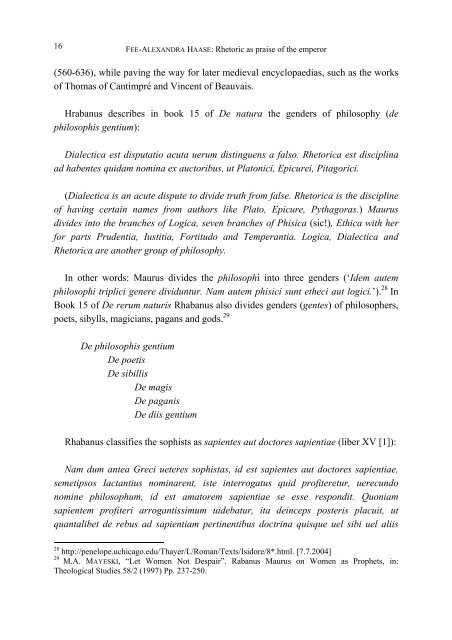Rabanus Maurus - Concilium medii aevi
Rabanus Maurus - Concilium medii aevi Rabanus Maurus - Concilium medii aevi
16 FEE-ALEXANDRA HAASE: Rhetoric as praise of the emperor (560-636), while paving the way for later medieval encyclopaedias, such as the works of Thomas of Cantimpré and Vincent of Beauvais. Hrabanus describes in book 15 of De natura the genders of philosophy (de philosophis gentium): Dialectica est disputatio acuta uerum distinguens a falso. Rhetorica est disciplina ad habentes quidam nomina ex auctoribus, ut Platonici, Epicurei, Pitagorici. (Dialectica is an acute dispute to divide truth from false. Rhetorica is the discipline of having certain names from authors like Plato, Epicure, Pythagoras.) Maurus divides into the branches of Logica, seven branches of Phisica (sic!), Ethica with her for parts Prudentia, Iustitia, Fortitudo and Temperantia. Logica, Dialectica and Rhetorica are another group of philosophy. In other words: Maurus divides the philosophi into three genders (‘Idem autem philosophi triplici genere dividuntur. Nam autem phisici sunt etheci aut logici.’). 28 In Book 15 of De rerum naturis Rhabanus also divides genders (gentes) of philosophers, poets, sibylls, magicians, pagans and gods. 29 De philosophis gentium De poetis De sibillis De magis De paganis De diis gentium Rhabanus classifies the sophists as sapientes aut doctores sapientiae (liber XV [1]): Nam dum antea Greci ueteres sophistas, id est sapientes aut doctores sapientiae, semetipsos Iactantius nominarent, iste interrogatus quid profiteretur, uerecundo nomine philosophum, id est amatorem sapientiae se esse respondit. Quoniam sapientem profiteri arrogantissimum uidebatur, ita deinceps posteris placuit, ut quantalibet de rebus ad sapientiam pertinentibus doctrina quisque uel sibi uel aliis 28 http://penelope.uchicago.edu/Thayer/L/Roman/Texts/Isidore/8*.html. [7.7.2004] 29 M.A. MAYESKI, “Let Women Not Despair”. Rabanus Maurus on Women as Prophets, in: Theological Studies 58/2 (1997) Pp. 237-250.
uideretur excellere. 30 Philosophi Philosophi fisici Philosophi fisi Philosophi ethici Philosophi logici Phisica Arithmetica Astronomica Astrologia Mechanicia Medicina Geometrica Musica Ethica Prudentia Iustitia Fortitudo Temperantia Logica Dialectica Rethorica FEE-ALEXANDRA HAASE: Rhetoric as praise of the emperor Augustine definies in De Dialectica (liber I.) dialectics as the science of good dispute: Dialectica est bene disputandi scientia. Disputamus autem utique verbis. Verba igitur aut simplicia sunt aut coniuncta. Simplicia sunt quae unum quiddam significant ut cum dicimus ‘homo equus disputat currit’. Nec mireris, quod ‘disputat’, quamvis ex duobus conpositum sit, tamen inter simplicia numeratum est; nam res definitione inlustratur. 30 Rhabanus Maurus: De rerum naturis. Book 15: http://www.mun.ca/rabanus/drn/15.html. [7.7.2004] 17
- Page 1 and 2: Rhetoric as praise of the emperor a
- Page 3 and 4: FEE-ALEXANDRA HAASE: Rhetoric as pr
- Page 5 and 6: FEE-ALEXANDRA HAASE: Rhetoric as pr
- Page 7 and 8: FEE-ALEXANDRA HAASE: Rhetoric as pr
- Page 9 and 10: FEE-ALEXANDRA HAASE: Rhetoric as pr
- Page 11 and 12: FEE-ALEXANDRA HAASE: Rhetoric as pr
- Page 13 and 14: FEE-ALEXANDRA HAASE: Rhetoric as pr
- Page 15: FEE-ALEXANDRA HAASE: Rhetoric as pr
- Page 19 and 20: FEE-ALEXANDRA HAASE: Rhetoric as pr
- Page 21 and 22: FEE-ALEXANDRA HAASE: Rhetoric as pr
- Page 23 and 24: FEE-ALEXANDRA HAASE: Rhetoric as pr
- Page 25: Free-Alexandra Haase: Rhetoric as p
16<br />
FEE-ALEXANDRA HAASE: Rhetoric as praise of the emperor<br />
(560-636), while paving the way for later medieval encyclopaedias, such as the works<br />
of Thomas of Cantimpré and Vincent of Beauvais.<br />
Hrabanus describes in book 15 of De natura the genders of philosophy (de<br />
philosophis gentium):<br />
Dialectica est disputatio acuta uerum distinguens a falso. Rhetorica est disciplina<br />
ad habentes quidam nomina ex auctoribus, ut Platonici, Epicurei, Pitagorici.<br />
(Dialectica is an acute dispute to divide truth from false. Rhetorica is the discipline<br />
of having certain names from authors like Plato, Epicure, Pythagoras.) <strong>Maurus</strong><br />
divides into the branches of Logica, seven branches of Phisica (sic!), Ethica with her<br />
for parts Prudentia, Iustitia, Fortitudo and Temperantia. Logica, Dialectica and<br />
Rhetorica are another group of philosophy.<br />
In other words: <strong>Maurus</strong> divides the philosophi into three genders (‘Idem autem<br />
philosophi triplici genere dividuntur. Nam autem phisici sunt etheci aut logici.’). 28 In<br />
Book 15 of De rerum naturis Rhabanus also divides genders (gentes) of philosophers,<br />
poets, sibylls, magicians, pagans and gods. 29<br />
De philosophis gentium<br />
De poetis<br />
De sibillis<br />
De magis<br />
De paganis<br />
De diis gentium<br />
Rhabanus classifies the sophists as sapientes aut doctores sapientiae (liber XV [1]):<br />
Nam dum antea Greci ueteres sophistas, id est sapientes aut doctores sapientiae,<br />
semetipsos Iactantius nominarent, iste interrogatus quid profiteretur, uerecundo<br />
nomine philosophum, id est amatorem sapientiae se esse respondit. Quoniam<br />
sapientem profiteri arrogantissimum uidebatur, ita deinceps posteris placuit, ut<br />
quantalibet de rebus ad sapientiam pertinentibus doctrina quisque uel sibi uel aliis<br />
28 http://penelope.uchicago.edu/Thayer/L/Roman/Texts/Isidore/8*.html. [7.7.2004]<br />
29 M.A. MAYESKI, “Let Women Not Despair”. <strong>Rabanus</strong> <strong>Maurus</strong> on Women as Prophets, in:<br />
Theological Studies 58/2 (1997) Pp. 237-250.



